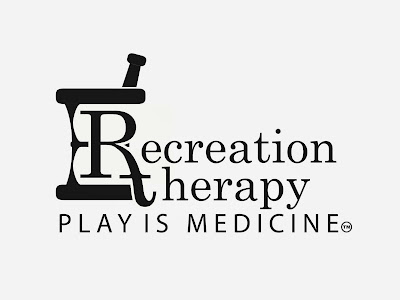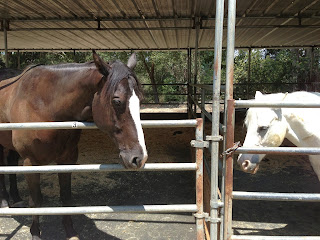 |
| My professor came up with the phrase, I came up with the pestle and mortar idea, and Timothy designed this amazing logo that has been used nationally! |
I split my time between two programs, a locked psychiatric facility (520D) and a substance and alcohol abuse rehabilitation residential program (First Step).
520D is for people who are considered a danger to themselves, others, or gravely disabled (i.e. suicidal, homicidal, or unable to meet their own basic needs). Patients stay as long as they need/want; any where from a few days to a few weeks. The goal is to stabilize and discharge and then continue outpatient mental health services. It's like an ER for mental health. There are nurses, psychiatrists, social workers, pharmacists, dieticians, clergy, and recreation therapists on the team. Recreation Therapy taught classes all day on how to improve mental health, increase independence, and increase the quality of life. The classes I taught were:
Recovery: how to get better, and what that looks like for each individual
Relaxation: guided imagery, deep breathing, progressive muscle relaxation, and other tools to relax and focus the body and mind were taught and practiced. This offers an opportunity for people to learn how to take control.
Exercise: we focused mostly on stretching and simple exercises that can be done while sitting. Essentially demonstrating that they don't have to be Olympians to do something to get the blood flowing. For people who have mental health issues, exercise is a huge contributor to feeling better.
Leisure Education: How do you fill your free time? People who are suffering in mental health are more likely to do very little in their free time. The more you participate in activities that make you happy, the happier you are. I know it sounds obvious, but when you are experiencing depression, you just don't feel like doing much with anyone.
Coping Skills: This group is all about how you deal with life, and all the ups and downs. It takes practice. How do you handle your emotions? What do you do when you get really mad? What do you do when you get really sad?
Healthy Living: We talked about creating a lifestyle that works for you, like creating schedules, putting reminders on your phone so you don't miss your medication, exercising first thing so you can fit it in, making time to socialize, meeting ones owns basic needs first, etc.
Nutrition: it is amazing how much a poor diet can affect our mental health. We talked about small changes we can make to help us feel better, even if it is something as simple as NOT eating that chocolate that you crave every time you get a migraine, but every time it makes your migraine worse (that's what I am working on).
On top of this we also played the Wii, had arts and crafts, and spent time on the patio. Each of these are a great way to unwind, practice the skills taught in groups, and socialize. So yes, playing the Wii with a patient is playing, but as a Rec Therapist, I am also helping the individuals meet their goals. For example, if a patient has identified that he isolates when his mental health is getting really bad, then while he is playing the Wii, we work on social skills between him and other patients. It's not quite so hard to practice meeting your goals when you are having fun doing it.
 |
| When your self esteem is low, it certainly is helpful to be able to casually play a game, do well, and have others cheer for you. |
So
in 520D, we worked to help people make very basic changes in their
thoughts, behaviors, and feelings. And recreation is the tool we used to
help that happen.
In
First Step, I did not teach as many classes because that is not how the
program worked. Instead, we provided a lot of one on one education and
community integration.
One
on one education was done through assessments and assignments. We
started by identifying what purpose using substances served (i.e.
numbing emotions, increasing energy...), what prevents you from doing
activities you want to do (i.e. lack of money, lack of time, lack of
transportation, lack of motivation, drug use...) as well as identifying
what activities they have done and enjoyed as well as activities they
have never done but think they might enjoy. This process helps identify
what they enjoy, what they want to do, how they can make it happen, and
how their substance use negatively affects their life.
It
takes a lot of courage to try new things, especially when you have
spent so much of your life focusing on a very narrow set of activities
(i.e. using drugs, obtaining drugs, watching TV). In recreation
therapy, I was able to help provide a safe place to try new things, to
process the emotions before, during, and after, and to find ways to
increase positive emotions.
Here are some examples of interventions I helped facilitate:
This
is Webb, he is a animal assisted therapy dog. He works on the Menlo
Park campus and his job is to socialize. When dogs go through training,
not all dogs pass on to be a service dog that will work as one
individuals helper. Webb didn't pass on because, well, he's pretty
lazy. Which makes him perfect for being a facility dog. He comes and
visits people. Animals make people happy (not all people), but we also
used Webb and other dogs to teach responsibility to the veterans. If
you have to train a dog and positively hold them accountable, it helps
teach you how to be more consistent and interact positively with others
when they do something you don't feel they should. Also, if you have
been struggling to take care of yourself, now you are responsible not
only for yourself, but another living creature can really help some
people step up.
We had drum circles. Everyone sits in a circle with a drum and we play the drums together (don't worry, I did not facilitate this, I ain't got no rhythm. We had a professional drummer come and help with that part!) So besides the benefit of wailing on a drum to get out some pent up frustration, we worked on communication skills, self expression, self control, and personal emotions. We had people take turns leading by playing their own beat that others followed, we had "call and answer" which involves someone playing a beat and others returning the beat or building off that beat, we got louder and softer, and we just let loose to have some fun.
Here is a perk of my job, we took our vets to a golf clinic. I got free golf lessons and was able to drive a golf cart all day! We took any veterans who were interested in going, whether they had played before or not. They were split into smalls groups, each with a volunteer who had experience teaching, and played 9-holes. It was such a blast being out in the sun all day. The men I played with were able to work on being part of a team, focusing on themselves and what was working and was not working with how they played, work through frustration, and get some physical activity.
Look, horses! We took several vets to groom and ride horses. One gentleman, we learned during his initial visit, used to own horses, but his ex-wife got them in the divorce they had after a catastrophic event. The divorce and event led to his drinking. By taking him to take care of these animals he was able to work through some of his trauma, take control, and remember what it felt like to be involved with his passions prior to alcoholism.
We took a tour of Alcatraz! (My first time there!) Besides getting out, outings like this provide an opportunity to practice the skills being learned in the program. Many vets had to face things that make them uncomfortable/have feelings of post traumatic stress from the boat ride, being back in a prison, seeing/hearing gunshots...
This is a surprisingly fun one, tying fly's for fly-fishing. One vet who suffers from severe depression talked about this for weeks, "I made that. I can't believe I actually created something. I did that!" Feelings from completing activities like this can instill hope, inspiration, and drive.
We took them to the casting ponds in San Francisco. Here they practiced their cast for fly fishing. They were able to enjoy some fresh air and try something new, as well as meet new people who genuinely want to help. The people that run this pond will help people get into this sport at no cost if they are really interested! One of the volunteers is a recovering alcoholic, and this is the sport that helped put her on the right track.
Oh, a walk on the beach is just what the doctor (or rec therapist in this case) ordered.
For
my final project I created a Coping Skills Faire for the participants
to practice the skills they learn in the program. We played Coping
Skills Jeopardy. We experienced a progressive muscle relaxation while
taking note of our pulse and breath rate before and after in order to demonstrate what a difference it makes when we focus on relaxing.
Freeze tag where we have to ask for help in order to get unfrozen. And
several others, including this one in the picture, an anger thermometer.
I read out scenarios that might make people to feel upset and then they
stood next to the number that corresponded to how angry they thought
that might make them feel. ("Someone tells you to calm down." "You are
charged a fee from your bank." "You're cut off on the freeway." "A close
friend is diagnosed with a terminal illness."...) Zero is in the shade
next to the fountain, ten is out in the hot sun. Some people got upset
at always being in the hot sun, which was a perfect opportunity to talk
about why they were always at a ten.
During my internship I also spent time in other facilities. This first picture is a duet bike at the senior living facility. People who have little to no balance and/or are wheelchair bound can still go on bike rides! This therapeutic intervention is proven to help reduce depression in older adults, so they take their residents who have depression out on bike rides once or twice a week to help reduce it!
And
this is a bike that I rode with residents at the Blind Center. Yes, we
took people who are blind on bike rides! This is a side by side tandem
bike. I steered, but we both peddled. If you look in the background,
there is another bike that is a front and back tandem bike.











That is AWESOME Allison! I think that so cool!! When did you know this is what you wanted to go into?
ReplyDeleteSince the end my Sophomore year in college. I didn't know what to do, so Tim helped me identify that I wanted to help people. I talked to a bunch of departments and Recreation Therapy just clicked.
ReplyDelete